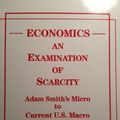
Byron Hahn, a/k/a Soon K. Hahn, et ux., Petitioners, v. John W. Bihlmire, Etc. U.S. Supreme Court Transcript of Record with Supporting Pleadings
STEPHEN LEONARD
By overwhelming consensus, modern economics began with the appearance of Adam Smith;s Wealth of Nations in 1776. This was the era of Newton and Calvin, great intellectuals struggling with religion, science, and human's place in the universe. Risk and uncertainty were coming under greater control through management techniques including insurance, annuities, organized equity markets, and futures trading. Capitalism was emerging as an economic system. Smith wanted to create more national wealth, more goods and service, in the context of an ordered, moral society. His emphasis was on equilibrium, states of rest, based upon laws of nature rather than upon chaotic change and highly disruptive shocks. Newton's vision of God as a watchmaker who winds the fine mechanism of the universe and then sets it in motion, was intertwined with Calvin's moral principles of grace, hard work, and thrift in Smith's laissez-faire, free market arguments. The basic perspective of modern economics has remained the same sine the time of Smith. It continues to stress three themes: Change can be channeled or harnessed to increase nation wealth. All rational individuals pursue their won unlimited self interests. Because of the biding constraints of nature and the physical world, unlimited human desires mean constant scarcity. This is true for individuals and for societies as a whole. The fundamental definition of economics is THE STUDY OF SCARCITY. This book explains Modern Economics, Micro vs. Macr
Booko found 2 book editions
Product filters
| Product |
Details
|
Price
|
New
|
Used
|
|---|---|---|---|---|
|
|
New: Being refreshed...
Used: Being refreshed...
|
New: Being refreshed...
Used: Being refreshed...
|
Being refreshed... | Being refreshed... |
|
|
New: Being refreshed...
Used: Being refreshed...
|
New: Being refreshed...
Used: Being refreshed...
|
Being refreshed... | Being refreshed... |
Booko collects this information from user contributions and sources on the internet - it is not a definitive list of editions. Search Booko for other editions of Byron Hahn, a/k/a Soon K. Hahn, et ux., Petitioners, v. John W. Bihlmire, Etc. U.S. Supreme Court Transcript of Record with Supporting Pleadings.




















